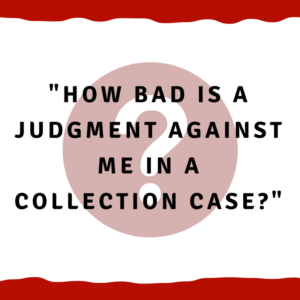How bad is a judgment against me in a collection case?
“How bad is a judgment against me in a collection case?”
 So you have been sued by a debt buyer and you are wondering, “How bad is a judgment against me anyway?”
So you have been sued by a debt buyer and you are wondering, “How bad is a judgment against me anyway?”
Pretty bad.
Here is a list of the negative consequences:
- Judgment goes on your credit reports
- Debt buyer/debt collector can garnish your wages (25%)
- Debt buyer/debt collector can garnish your bank accounts
- They can even force the sale of your property (sheriff’s sale)
Let’s look at these and then look at the solution to avoiding a judgment. Oh, and remember that a judgment makes a lot of interest — a good rule of thumb is a typical judgment will double every six years if you are not making payments on it.
It goes on your credit reports
When there is a judgment, it is considered a “public record” and it normally will be picked up by the credit reporting agencies and put on your credit reports.
This is separate from any account that the debt buyer has.
Example: Midland Funding sues you and gets a judgment.
Midland will have its account on your credit report. And then the judgment will also be on there.
Debt buyer/debt collector can garnish your wages (25%)
A judgment allows the debt buyer to garnish, or take, your wages up to 25%.
Example: Portfolio Recovery wins the case against you and your take home pay is $1600 every two weeks.
You would normally be garnished about $400 every paycheck — 25% of your wages.
Debt buyer/debt collector can garnish your bank accounts
In addition to all of that, with winning the case against you, a debt collector can reach in and take your money out of your bank accounts.
This is not real common but it does happen and you need to be aware of this.
They can even force the sale of your property (sheriff’s sale)
Very rare, but I have seen it, is to try to sell your home in a “sheriff’s sale” which is like a foreclosure. Now, in my experience, I have only seen this happen when your property is owned outright or has a lot of equity in it. But there are no guarantees.
But even if they don’t sell your property, they can put a lien on it which means that you can’t sell it or refinance it without paying off the lien.
So what do you do to avoid a judgment?
First, answer the lawsuit in time. You can read about how to file an answer if you are going to do this on your own.
Second, make sure you go through our five step process.
Third, if you want to have help thinking through your options — give us a call at 1-205-879-2447 or contact us through our website and we’ll be happy to help you.